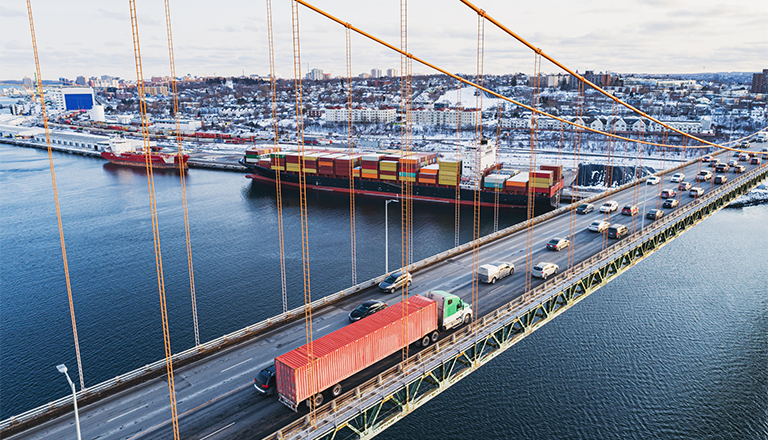
Risk management with Incoterms 2020: Exporting made safer
Author details
Emiliano Introcaso, CITP
Advisor & senior product operations manager
In this article:
Incoterms are internationally accepted definitions for the most common terms used in sales contracts of goods. Incoterms 2020 came into force on January 1, 2020, superseding the earlier Incoterms 2010.
The idea behind Incoterms is simple: To provide standardized logistics terminology to help prevent confusion and disagreement between international sellers and buyers. It’s very important for Canadian companies to use these terms as Canada’s export markets are diverse and the logistics of supply chains have become more complex.
What are Incoterms?
Incoterms are universally recognized terms used in most international sales contracts to reduce the logistical risks of doing business around the world. The three-letter acronyms mean the same thing in any contract anywhere. As a result, both sellers and buyers can clearly understand their contractual rights and responsibilities when delivering or receiving goods internationally.
According to the Forum for International Trade Training (FITT), Incoterms “are used in negotiations to resolve who is responsible for the expenses associated with a shipment at a specific point in the shipment’s journey such as export packing costs, the main transport costs and custom duties.”
To help businesses master Incoterms 2020 rules and succeed internationally, FITT has partnered with the Canadian Chamber of Commerce (CCC) to offer the only Incoterms 2020 in-class training across Canada, which is officially recognized by the International Chamber of Commerce (ICC). This training is also offered in partnership with the Canadian Trade Commissioner Service (TCS) and Export Development Canada (EDC).
Why are Incoterms so important to international logistics?
Global trade moves goods among many different markets with myriad languages and business cultures. Simply signing a contract isn’t enough. By using Incoterms, you can prevent potential disputes or misunderstandings over logistics and make the export and import responsibilities very clear to both parties.
You should also check out
Expand your understanding of the 11 universal trade terms used in global sales contracts and how they impact your business operations.
What do Incoterms cover?
They outline obligations, risks and costs in a series of 10 articles that accompany each Incoterm. The “A” articles, which represent the seller’s obligations, and the “B” articles, which represent the buyer’s obligations, are as follows:
A1/B1 |
General obligations |
A2/B2 |
Delivery/taking delivery |
A3/B3 |
Transfer of risks |
A4/B4 |
Carriage |
A5/B5 |
Insurance |
A6/B6 |
Delivery/transport document |
A7/B7 |
Export/import clearance |
A8/B8 |
Checking/packaging/marking |
A9/B9 |
Allocation of costs |
A10/B10 |
Notices |
Note: Delivery of the cargo isn’t specifically defined (for example, it has to be delivered to the buyer’s warehouse). Instead, it refers to the seller fulfilling the obligation of the terms of sale, or to the seller completing a contractual obligation. This means that “delivery” can take place at any point in the physical movement of the cargo.
Having a contract is simply not enough, especially given the potential language barriers and different meanings around a particular term or phrase.
FITT’s Global Value Chain also emphasizes that the use of Incoterms doesn’t replace the need for a contract. The terms “are a standardized means of setting out obligations with respect to carriage and insurance. They don’t contain provisions for delivery times and do not regulate the issue of title.” This means that your contract should always specify a delivery time and state when title transfer (transfer of ownership) takes place.
In an increasingly complex global trade environment, export transactions carry many obligations and risks—for both importers and exporters—at every stage of the process.
How can Incoterms reduce your risks?
- They can help you avoid disagreements over who carries the risk at various points in the logistics process. This helps you get the right insurance for the period during which you carry the risk.
- They can help you avoid disputes over alleged late delivery and lower your risk of late-delivery penalties.
- They provide a stable risk environment by imposing certainty on a sales contract. For example, using the appropriate Incoterms rules can help ensure that you get paid for a shipment.
“Using the correct Incoterms in an international transaction helps the parties involved identify the risks for which they’re responsible,” says Amesika Baëta, EDC’s GTA West regional director, Mid-Market. “At the same time, they can take pre-emptive steps to mitigate potential risks that could arise during the transaction.”
You should also check out
Less waste, higher efficiency among ESG benefits.
What can happen if you don’t use Incoterms properly?
“Using the wrong Incoterm can result in errors in the pricing of goods and misunderstanding of the obligations and division of responsibilities that are being negotiated between the buyer and the seller. This can lead to significant unanticipated liabilities for a company, which can be very costly,” Baëta says.
She adds that “companies often don’t ensure that the Incoterms in their sales agreements match across all the contracts involved in the transaction. When something goes wrong, the disagreements tend to focus on risks and responsibilities that could have been avoided with the accurate use of Incoterms in the contract. I’ve seen this happen and it can cost companies inordinate amounts of time and money to resolve.”
For more in-depth information about Incoterms and how they can impact your business, read our four-part series. You can also find answers to your trade-related questions on our Export Help Hub.
To teach businesses about these terms, FITT and the CCC are offering Incoterms 2020 training across Canada.
- Visit the FITT Incoterms page for details about in-class ICC Canada training, providing participants with both a refresher on Incoterms and what they mean for their businesses.
- You can also visit the ICC Incoterms 2020 pages to sign up for email alerts, ask questions online and purchase a range of resources, including the Incoterms 2020 guide.
- For other international trade-related courses, certification and resources, visit fittfortrade.com.
EDC’s Export Help Hub provides expert answers to the most frequently asked trade-related questions. Create a free MyEDC account for the answers to these questions about Incoterms, or ask an advisor a question of your own.
3. Who is responsible for paying import costs and customs duties?

















